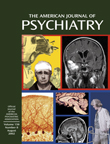Correlates of Change in Functional Status of Institutionalized Geriatric Schizophrenic Patients: Focus on Medical Comorbidity
Abstract
OBJECTIVE: Impairment in basic self-care skills is common in patients with schizophrenia and is even more severe in elderly patients with a chronic course of institutional care. While cognitive impairment has proven to be a major predictor of overall functional deficit in schizophrenia, other potential factors, such as medical comorbidity, need to be considered. METHOD: Geriatric institutionalized schizophrenic patients (N=124) were assessed three times over 4 years to determine levels of positive and negative symptoms, impairment in activities of daily living, impairment in cognitive functioning, and medical problems. Path analysis was used to determine which variables best predicted changes in self-care functions. RESULTS: Functional status, negative symptoms, cognitive functions, and health status all significantly worsened during the follow-up. The path analyses showed that change in health status did not predict change in activities of daily living after the analysis accounted for negative symptoms and cognitive functions. DISCUSSION: The results highlight the relative importance of cognitive impairments in the functional impairments of older schizophrenic patients with increased medical burden.



